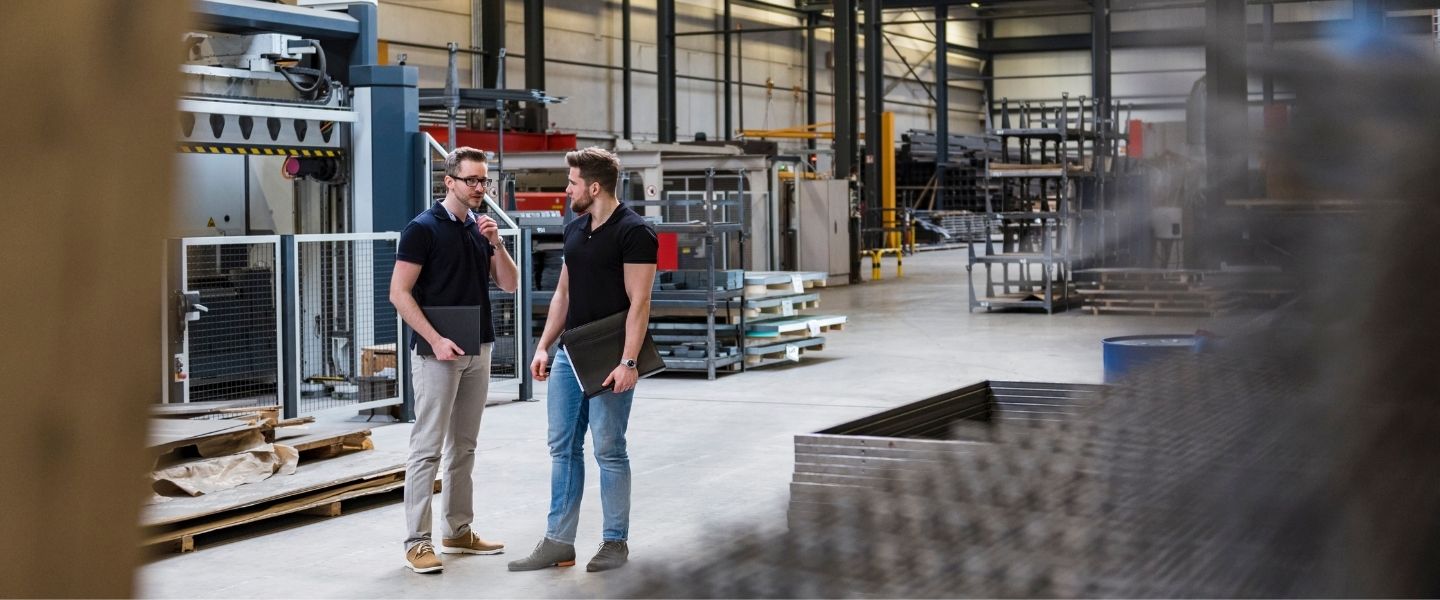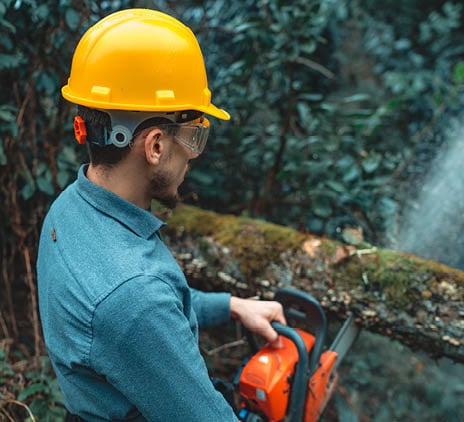-
Financial administration & outsourcing
Entrepreneurs who outsource financial administration reduce the number of administrative tasks and consequently have more time and space to focus on growth.
-
Financial insight
We help you turn financial data into valuable insights that support you in making well-founded decisions. In-depth analyses of your financial situation will help give you a better idea of where you stand and where the opportunities for growth lie, both in the short and long term.
-
Financial compliance
We make sure your company complies with financial legislation and regulations, with correct financial statements, tax reports and other obligations. From our global network, we support you in managing local and international tax risks.

-
Impact House by Grant Thornton
Building sustainability and social impact. That sounds good. But how do you go about it in the complex world of stakeholders, regulations and frameworks and changing demands from clients and society? How do you deal with important issues such as climate change and biodiversity loss?
-
Business risk services
Minimize risk, maximize predictability, and execution Good insights help you look further ahead and adapt faster. Whether you require outsourced or co-procured internal audit services and expertise to address a specific technology, cyber or regulatory challenge, we provide a turnkey and reliable solution.
-
Cyber risk services
What should I be doing first if my data has been kidnapped? Have I taken the right precautions for protecting my data or am I putting too much effort into just one of the risks? And how do I quickly detect intruders on my network? Good questions! We help you to answer these questions.
-
Deal advisory
What will the net proceeds be after the sale? How do I optimise the selling price of my business or the price of one of my business activities?
-
Forensic & integrity services
Do you require a fact finding investigation to help assess irregularities? Is it necessary to ascertain facts for litigation purposes?
-
Valuations
Independent and objective valuations tailored for mergers, acquisitions, and legal matters.

-
Auditing of annual accounts
You are answerable to others, such as shareholders and other stakeholders, with regard to your financial affairs. Financial information must therefore be reliable. What is more, you want to know how far you are progressing towards achieving your goals and what risks may apply.
-
IFRS services
Financial reporting in accordance with IFRS is a complex matter. Nowadays, an increasing number of international companies are becoming aware of the rules. But how do you apply them in practice?
-
ISAE & SOC Reporting
Our ISAE & SOC Reporting services provide independent and objective reports on the design, implementation and operational effectiveness of controls at service organizations.

-
International corporate tax
The Netherlands’ tax regime is highly dynamic. Rules and the administrative courts raise new challenges in fiscal considerations on a nearly daily basis, both nationally and internationally.
-
VAT advice
VAT is an exceptionally thorny issue, especially in major national and international activities. Filing cross-border returns, registering or making payments requires specialised knowledge. It is crucial to keep that knowledge up-to-date in order to respond to the dynamics of national and international legislation and regulation.
-
Customs
Importing/exporting goods to or from the European Union involves navigating complicated customs formalities. Failure to comply with these requirements usually results in delays. In addition, an excessively high rate of taxation or customs valuation for imports can cost you money.
-
Human Capital Services
Do your employees determine the success and growth of your organisation? And are you in need of specialists which you can ask your Human Resources (HR) related questions? Human Resources (HR) related questions? Our HR specialists will assist you in the areas of personnel and payroll administration, labour law and taxation relating to your personnel. We provide you with high-quality personnel and payroll administration, good HR guidance and the right (international) advice as standard. All this, of course, with a focus on the human dimension.
-
Innovation & grants
Anyone who runs their own business sets themselves apart from the rest. Anyone who dares stick their neck out distinguishes themselves even more. That can be rather lucrative.
-
Tax technology
Driven by tax technology, we help you with your (most important) tax risks. Identify and manage your risks and become in control!
-
Transfer pricing
The increased attention for transfer pricing places greater demands on the internal organisation and on reporting.
-
Sustainable tax
In this rapidly changing world, it is increasingly important to consider environmental impact (in accordance with ESG), instead of limiting considerations to financial incentives. Multinational companies should review and potentially reconsider their tax strategy due to the constantly evolving social standards
-
Pillar Two
On 1 January 2024 the European Union will introduce a new tax law named “Pillar Two”. These new regulations will be applicable to groups with a turnover of more than EUR 750 million.
-
Cryptocurrency and digital assets
In the past decade, the utilization of blockchain and its adoption of a distributed ledger have proven their capacity to revolutionize the financial sector, inspiring numerous initiatives from businesses and entrepreneurs.
-
Streamlined Global Compliance
Large corporations with a presence in multiple jurisdictions face a number of compliance challenges. Not least of these are the varied and complex reporting and compliance requirements imposed by different countries. To overcome these challenges, Grant Thornton provides a solution to streamline the global compliance process by centralizing the delivery approach.
-
Corporate Law
From the general terms and conditions to the legal strategy, these matters need to be watertight. This provides assurance, and therefore peace of mind and room for growth. We will be pro-active and pragmatic in thinking along with you. We always like to look ahead and go the extra mile.
-
Employment Law
What obligations do you have with an employee on sick leave? How do you go about a reorganisation? As an entrepreneur, you want clear answers and practical solutions to your employment law questions. At Grant Thornton, we are there for you with clear advice, from contracts and terms of employment to complex matters such as dismissal or reorganisation.
-
Sustainable legal
At Grant Thornton, we help companies integrate sustainability into their business operations, with sustainable legal at the heart of our approach. We advise on ESG (Environmental, Social, Governance) legislation, and help draft sustainable contracts, implement HR policies, and carry out ESG due diligence in M&A transactions (Mergers and Acquisitions).
-
Maritime sector
How can you continue to be a global leader? The Netherlands depends on innovation. It is our high-quality knowledge which leads the maritime sector to be of world class.


In this article you will find a number of the most important proposals. Please note that these proposals still have to go through a formal procedure before the changes come into effect.
CBAM in a nutshell
The CBAM applies to companies that import products with high CO₂ emissions into the EU, such as steel, iron, cement, aluminium, electricity and fertiliser. These companies are required to pay a CO₂ tax on emissions released outside the EU during the production of these goods. This EU measure was introduced to prevent companies from moving their production to countries outside the EU where less strict environmental regulations apply.
The Omnibus Directive
The Omnibus Directive proposes several changes to the CBAM Regulation. Such as a reduction in the number of parties to which CBAM applies. It has also been proposed to make reporting easier.
The underlying idea is that a large group of importers now have a considerable administrative burden, while they import small quantities of CBAM goods. In other words: it costs these importers a lot of time and effort to collect and report all the necessary information. According to the European Commission, these administrative burdens do not outweigh the environmental benefits.
CBAM for a smaller group of importers
The European Commission proposes to apply the CBAM only when the imported quantity of steel, iron, aluminium, fertiliser and cement exceeds 50 tonnes. This does not apply to hydrogen and electricity.
The European Commission expects that this implies that only 10% of the current amount of importers will have the CBAM reporting obligations. This limited group is responsible for 99% of the CO₂ emissions.
Simplification measures
These are the main simplification measures for importers:
- An adjusted deadline for submitting the report
- You can use default values again
- No verification is required when applying default values
- You can authorise a third party to take care of the reporting
- The embedded emissions (the total amount of greenhouse gas emissions produced during the production of goods) are removed from the scope of CBAM
- The purchase of CBAM certificates will not take effect until 2027
- Has (the supplier of) the supplier already paid CO₂ levies in other countries? In that case, these costs will be deducted from your payment burden.
1. Adjusted reporting deadline
After the initiation of the final system in 2026 an importer must report the CO₂-emissions on an annual base. The draft proposes to prolong the reporting deadline; from the end of May until the end of August. As an importer, this means that you will have more time to collect the information about the previous year.
2. Use of default values
Until the third quarter of 2024, the importer can use default values that were published by the EU. Starting the third quarter of 2024, one must report based on actual values. The proposal is to give importers a choice to use default values again. It is expected that this will facilitate the reporting.
3. No verification in case of default values
Under the current rules – when applying actual values – an independent party must verify the emission values. The costs of such verification are to be paid by the importer.
As this verification can be a difficult process, it is proposed that no verification is required if an importer uses default values. This will give you more flexibility and time to file the report. Please note that using default values also has a cost-reducing effect when meeting the CBAM obligations.
4. Third-party reporting
At this moment, the importer must submit the report by itself. You cannot - or only indirectly – use a third-party service provider whilst filing.
The proposal would give importers the opportunity to lay the reporting obligations in the hands of third-party service providers. In that case, you do not need to file yourself. Of course, you remain responsible for timely and correct reporting.
5. Embedded emissions
At present, embedded emissions of certain [MOU1] [MV2] aluminium- and steel products fall within the scope of CBAM. In general, however, the emissions that take place during production is in general relatively low.
The EU Commission proposes to exclude these production processes from the emission calculation. As a result, the administrative burden for producers outside the EU will diminish.
6. Procurement of CBAM certificates
Based on the current legislation, an importer must throughout the years have a coverage of at least 80% of the CO₂-emissions by means of purchasing CBAM certificates. The national competent authority (NEa) may repurchase at the most a third of the - in the previous year acquired - certificates.
As this may have financial effects for the importer that cannot be expected upfront, it has been proposed to reduce this ratio to a coverage of 50%. Also, the limitation of the repurchasing of certificates shall disappear to a large extent. For 2026, a different arrangement will be in place, under which the certificates for 2026 can only be acquired in 2027.
7. Deduction of previously paid CO₂-levies
When determining the number of certificates to be sold, an entrepreneur may reduce the financial burden by deducting the CO₂-levies that (the supplier of) the supplier has already paid outside of the EU.
As there may be many parties involved in the import process, one cannot always exactly determine the paid levies. An example: goods that are being imported from China, may have parts in them for which in other countries already CO₂-levies have been paid.
The proposal is to create a reduction for the CO₂-levies paid in these other countries. In that respect, one may use country data to be published by the EU. Should this proposal enter into force, then it becomes even more important to chart the production chain of the CBAM goods for importers. This may reduce the burden of the CBAM payable.
What are the possible consequences of the proposals for your company?
In a nutshell: when the proposed Omnibus Directive enters into force and you import annually less than 50 tons of steel, iron, aluminium, fertilizer or cement, you will not have to file any report.
What if you must file a report? Then you have two options:
- a report based on actual data,
- audited by a verification, with all corresponding costs;
- a report based on default values.
- Be aware that these are higher than the actual values, but more easily to report and no verification is required.
If a reduction of the burden is required, then the CO₂-levies paid abroad should be clearly taken into consideration.
Good to know: if during a calendar year, the imported quantity of CBAM goods exceeds 50 tonnes; you must obtain, as soon as the threshold has been exceeded, the status of the authorised reporter. If you do not have that status, the competent authorities may impose fines and no imports of CBAM goods can be performed.
No final proposal
The above-described adjustments at present are not more than a proposal from the European Commission to the European Parliament. Later this year, this will be debated and may suggest amendment proposals. This could be an expansion, but also a limitation of the Omnibus proposal.
After the debate and the negotiations with the European Parliament, the final proposal will be submitted to the Council of Ministers. Once they have approved the (amended) proposal, it will be published in the EU Gazette. It could be expected that the adjustments will be finalised this year, making the proposal enter into force on January 1, 2026. For more information about the Omnibus, read our previous articles.
Do you have any questions? Feel free to contact us!
Do you need any assistance when determining the impact of the CBAM adjustment proposals for your company? Or do you have any other questions about this topic? Feel free to mail or call us: we are ready to assist.













